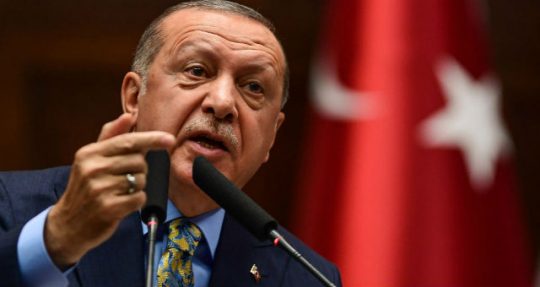In May 1950, the ruling political party in Turkey, which had governed for 27 straight years, held a free and fair election and lost—badly. Rather than contest—or worse, ignore—the results, the Republican People's Party handed over power to the victorious opposition. There was no bloodshed, no attempt to hold onto power. A deeply entrenched, somewhat authoritarian government that had dominated a one-party state for years allowed the democratic process to work. It was certainly a first in Turkish history, and one would be hard-pressed to find a previous, comparable example in all of Middle Eastern history. Sure, Turkey experienced volatile politics over the next several decades, but it continued to hold free and fair elections under the principle of one person, one vote. And 1950 was the hinge point. Sixty-nine years after that milestone, however, the period of Turkish democracy has effectively ended.
When he was mayor of Istanbul in the 1990s, now-Turkish President Recep Tayyip Erdogan compared democracy to a streetcar. "You ride it until you arrive at your destination," he said. "Then you step off." On Monday, Erdogan stepped off the streetcar, as Turkey's electoral authorities voided the result of the mayoral race in Istanbul from five weeks ago and ordered a rerun of the election. Erdogan's ruling Justice and Development Party, or AKP, lost the critical city on March 31 to an opposition candidate for the first time in 25 years. Seventeen days of appeals and recounting followed, until Turkey's national election board confirmed that the AKP lost. Still, Erdogan's coalition partners continued to push for another election, and the AKP filed a formal complaint, claiming there were fraud and irregularities, to Turkey's Supreme Election Council, which is stacked with Erdogan loyalists. The board ruled in favor of the AKP, enraging the opposition and large swaths of Turkish society. The Republican People's Party, which still exists today and is the main opposition, called the ruling a "plain dictatorship."
What does this latest development mean? Soner Cagaptay, a fellow at the Washington Institute for Near East Policy, put it well: Since 1950, it had been "one man, one vote" in Turkey, he wrote. "From now on it is: vote until the governing party wins." Indeed, in Turkey, democracy is on its back gasping for air, with Erdogan's boot pressing down on its throat. The open question is how long he will continue to torment his victim, steadily pressing harder while keeping it alive and suffering, until he presses down all of his weight and shuts its eyes for good.
This process of reversion—to go from democracy back to autocracy—did not happen over night. In fact, it has been happening for years, with Erdogan—who is an Islamist; he was never a moderate or a liberal—slowly but steadily hacking away at Turkey's democratic system. Erdogan became prime minister in 2003 with the goal of using Turkish democracy to undermine Turkey's secularism and replace it with political Islam. Over the next decade, Erdogan intimidated potential opponents by imprisoning active-duty generals and harassing secular opponents through surveillance. But he also implemented policies that brought economic growth and lifted Turks out of poverty, giving him a base of support. By the time Erdogan became president in 2014, he was on his way to becoming a new sultan looking to recreate a watered down Ottoman Empire. And this authoritarian regime would be governed by the Muslim Brotherhood's toxic ideology, which Erdogan has embraced.
Erdogan's creep toward authoritarianism has been progressive, building to the point that egregious actions do not seem so egregious, because they have become normal. Take the constitutional referendum in 2017 that replaced Turkey's parliamentary system with a presidential one, which abolished the post of prime minister and gave Erdogan broad executive powers. Ten years ago that vote would have been a step too far, but after 14 years of building to the point, the would-be dictator got what he wanted.
Today, Erdogan conducts mass purges of the military, the police, and the courts. He jails journalists and fires teachers and academics. He has inserted Islam into Turkey's schools. He is reshaping a democratic, secular country into something much more sinister. Rerunning Istanbul's mayoral race is just the latest step on this dark path, but it is also one of the most symbolic. Few actions better represent the fall of democracy than voiding an election because the ruling party lost.
The implications of the death of Turkish democracy are not good. As Cagaptay details in his latest book, The New Sultan: Erdogan and the Crisis of Modern Turkey, Erdogan has completely polarized his country into two camps: those who love him as a savior, and those who despise him as demonic. Amid external chaos in the ever-violent Middle East, internal chaos is not what Turkey needs. By virtue of its geographic location at the crossroads of east and west, its large economy, and its capable military, Turkey is an important player in regional, and even global, geopolitics. Having Turkey be a destabilized dictatorship does not bode well for the future. It is a blow to the cause of human freedom, and as Turkey turns away from the West, and toward the world's cruel and oppressive autocrats, it is a blow to American interests.
Rest in peace, Turkish democracy. The world will miss you—and eagerly wait for your return.
